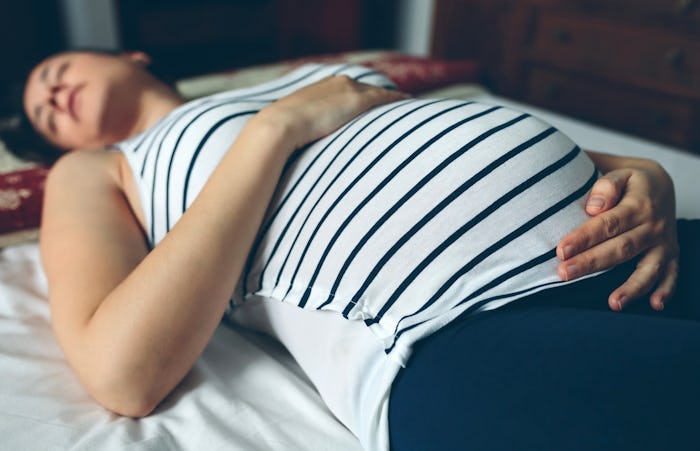Life

Here's How Sleeping On Your Back During Pregnancy *Really* Affects Your Baby's Health
There is a certain point in every woman's pregnancy where sleeping becomes an issue. Whether you are awake at night going over your to-do list or your belly has simply become too large to allow for restful slumber, you can rest assured — see what I did there? — you are not alone in your sleepless nights. But when you are able to catch some shut eye, you might find yourself worrying about the best sleeping position for you and your baby. Like, can sleeping on your back suffocate your baby during pregnancy? And do you have to sleep on your side?
"There are some studies that show an increased risk of stillbirth in babies whose moms slept on their back," Dr. Gina Posner, a pediatrician at MemorialCare Orange Coast Medical Center in Fountain Valley, California, tells Romper in an email interview. "This is due to a decrease in cardiac output and uterine perfusion due to aortocaval compression from the gravid uterus."
Posner says that while there are still more studies that need to be done to fully determine the level of danger involved in sleeping on the back while pregnant, sleeping on your side is best during pregnancy.
Dr. Danelle Fisher, a Fellow of the American Academy of Pediatrics (FAAP) and chair of pediatrics at Providence Saint John’s Health Center in Santa Monica, California, agrees, adding that while a baby will not suffocate if a mother sleeps on her back, "they could have diminished blood flow from the weight pressing on the major blood vessels to the heart."
According to Healthline, sleeping on your back while pregnant means your abdomen rests on your intestines and major blood vessels. The increased pressure from this position can cause backaches, breathing issues, digestive problems, low blood pressure, and, ugh, hemorrhoids, the website noted. That's why What to Expect has recommended sleeping on your side. The ultimate position is sleeping on your left side, according to the website, in order to allow "for maximum blood flow and nutrients to the placenta (less pressure on the vena cava)" as well as enhancing kidney function.
But being that a study by the National Sleep Foundation showed 78 percent of women reported more disturbed sleep during pregnancy than at other times, there has to be at least a semi-solution to getting some rest, right?
Whether you are dealing with heartburn and indigestion, or are simply a belly sleeper who can no longer snooze in your favorite position, Mama Natural noted that pillows, pillows, and more pillows will be your number one defense. Use all of the pillows you can find in your house or score a body pillow that is designed to help your pregnant body relax. U-shaped, wedge-shaped, and complete body-size pillows are all clear winners, according to the website.
It should be noted that in early pregnancy, the uterus is not large enough to cause compression of the vena cava, which is the issue later in pregnancy that leads to the recommendation of sleeping on the side, Dr. Yvonne Bohn, OB-GYN at Providence Saint John’s Health Center in Santa Monica, California, tells Romper in an email interview. As the pregnancy progresses, you may begin to feel short of breath or lightheaded as a result of lying on your back. That's when you'll want to lie on your left side and relieve pressure on the vena cava, Bohn says.
The good news is your discomfort during sleep will come to an end once your bundle of joy arrives. Ah, who am I kidding? You'll have a newborn baby on your hands. But, alas, that's parenting, right?
Experts:
Dr. Gina Posner, pediatrician at MemorialCare Orange Coast Medical Center
Dr. Danelle Fisher, Fellow of the American Academy of Pediatrics (FAAP) and chair of pediatrics at Providence Saint John’s Health Center
Dr. Yvonne Bohn, OB-GYN at Providence Saint John’s Health Center